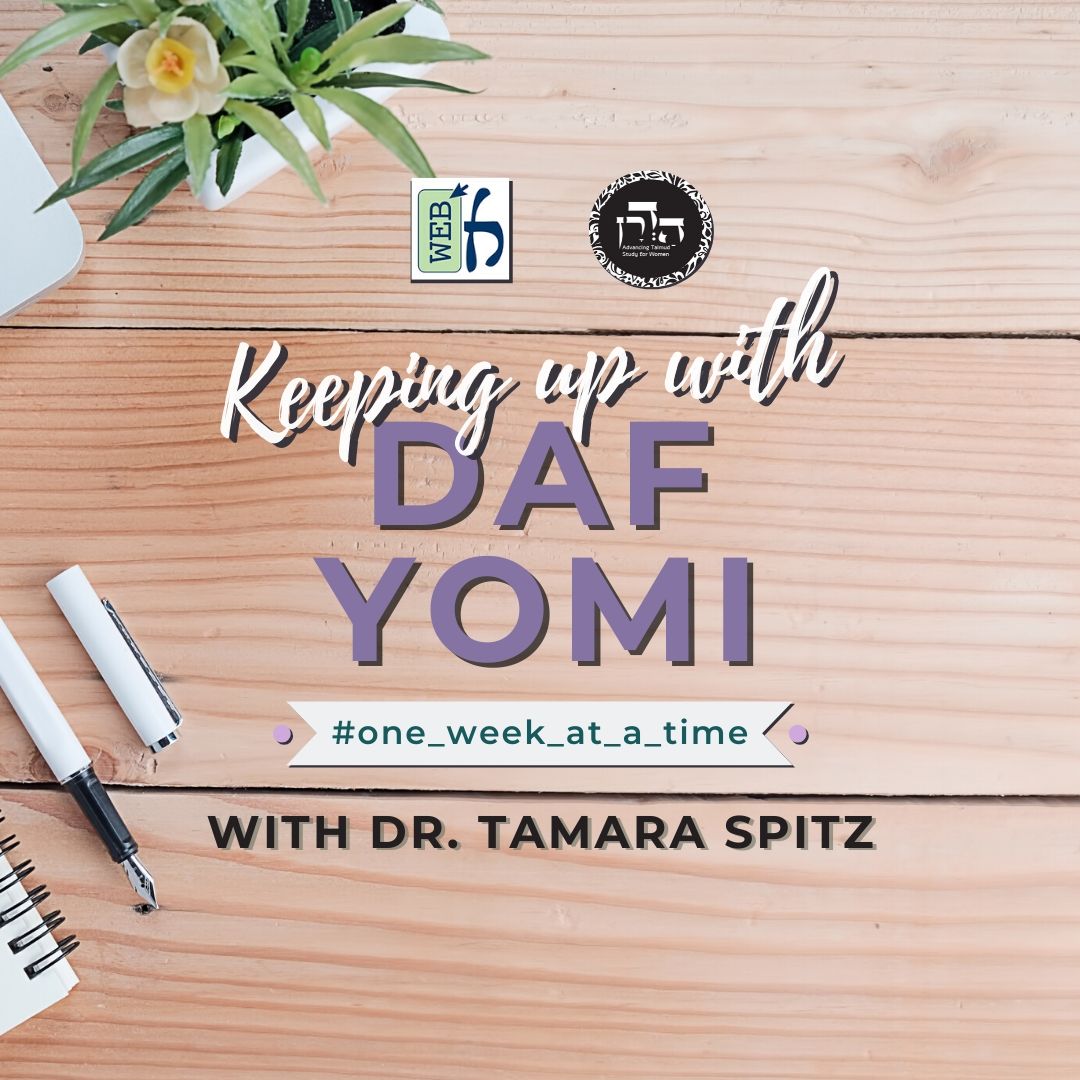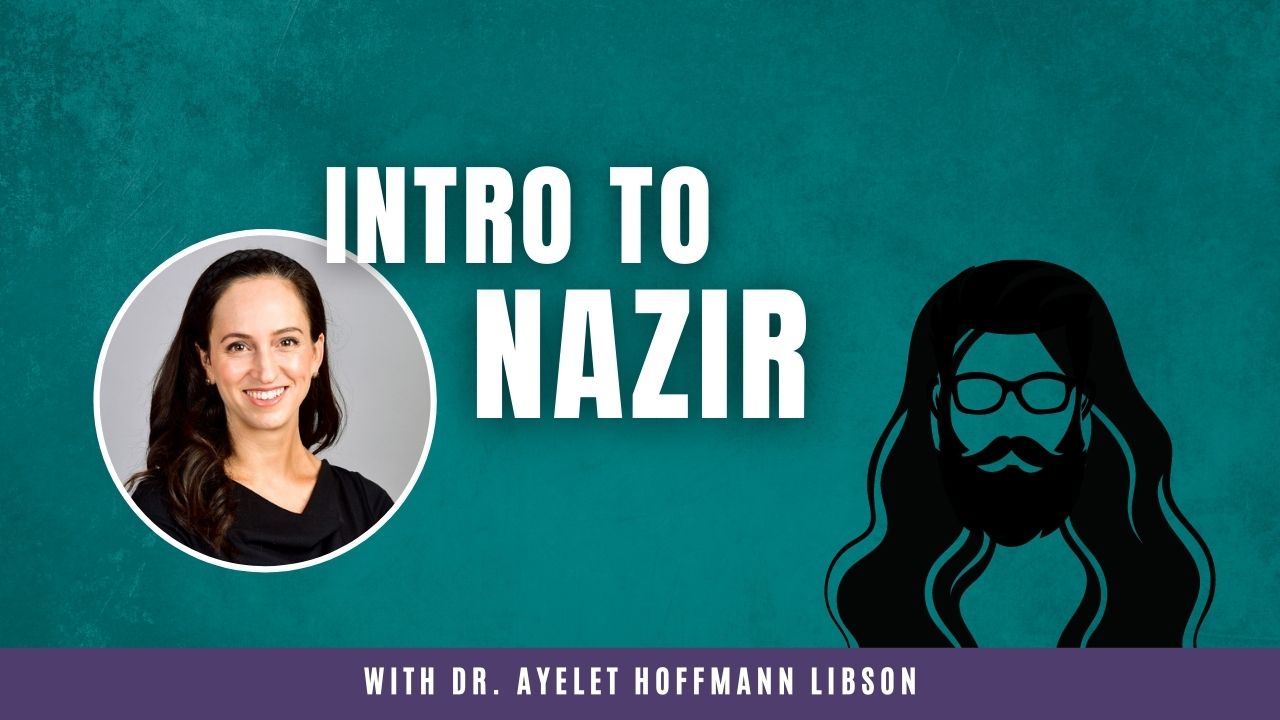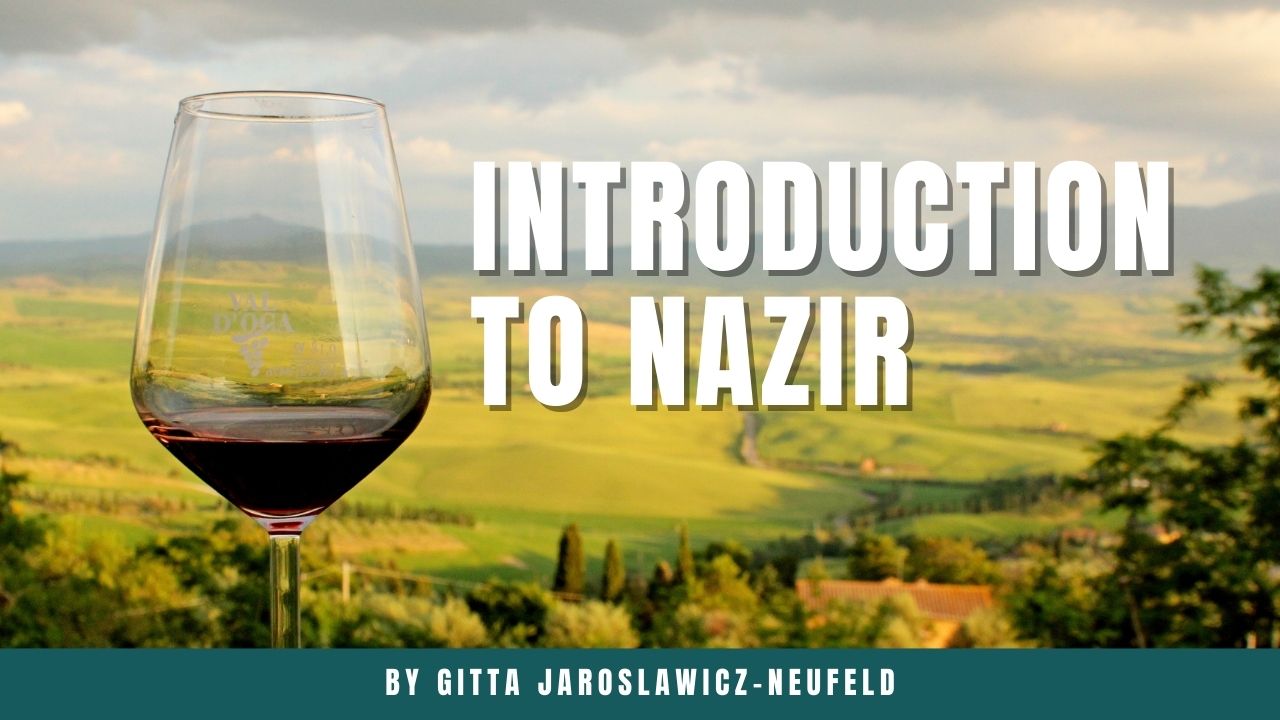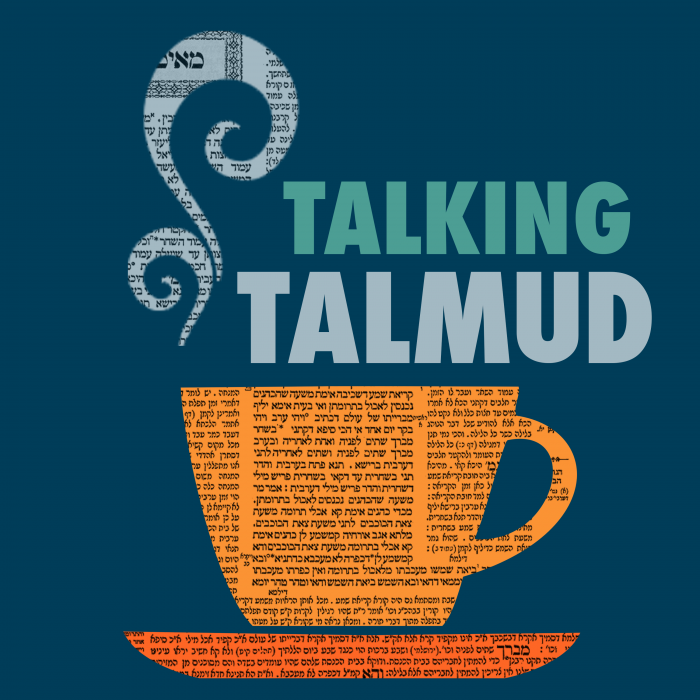What are expressions that if uttered, one would be considered a nazir, even if one did not explicitly say that one is taking it upon oneself to be a nazir? The Mishna discusses kinuyim, words synonymous with nazir and yadot, phrases that intimate that one wants to be a nazir, but are incomplete formulations. Why is Nazir in Seder Nashim? To answer this, the Gemara explains the connection between a nazir and a sotah – one who sees a sotah will realize that it was caused by drunkenness and will vow to become a nazir. Why did the Mishna begin with kinuyim and then move to explain yadot before going back to explain kinuyim? What can be learned about the literary structure from other mishnayot that have a similar or different order? What rules does the Gemara suggest? The Mishna said that if one says “I will be” that is a yad for nazir and that person is a nazir. Perhaps the person meant “I will be in a fast” and didn’t mean to become a nazir? Shmuel explains that the case is one where a nazir was walking by at the time. Does this teach us what Shmuel holds about an unclear intimation (yad)? Perhaps the person meant to take on the sacrificial responsibilities of the passing nazir and not to actually become a nazir? The Gemara answers that the person must have thought in their heart that they intended to become a nazir. How could this work if generally, we say that things one says in the heart are meaningless if not uttered? The Mishna ruled that if one says “I will beautify myself” they are a nazir. Perhaps they meant to beautify themselves with mitzvot? Shmuel explains that they are holding their hair at the time they make the declaration. How could becoming a nazir be called beautiful if the rabbis did not approve of people becoming a nazir?
Want to dedicate learning? Get started here:


Summary
Today’s daily daf tools:
Today’s daily daf tools:
Delve Deeper
Broaden your understanding of the topics on this daf with classes and podcasts from top women Talmud scholars.
New to Talmud?
Check out our resources designed to help you navigate a page of Talmud – and study at the pace, level and style that fits you.
The Hadran Women’s Tapestry
Meet the diverse women learning Gemara at Hadran and hear their stories.
Nazir 2
כׇּל כִּינּוּיֵי נְזִירוּת — כִּנְזִירוּת.
MISHNA: One becomes a nazirite by taking a nazirite vow, in which he simply declares himself a nazirite, as detailed in the Torah (Numbers 6:1–21). Additionally, all substitutes for the language of nazirite vows are like nazirite vows and are binding. Furthermore, intimations of nazirite vows, i.e., incomplete statements that are understood from context to be meant as nazirite vows, are considered binding nazirite vows.
הָאוֹמֵר ״אֱהֵא״ — הֲרֵי זֶה נָזִיר, אוֹ ״אֱהֵא נָאֶה״ — נָזִיר, ״נָזִיק״, ״נָזִיחַ״, ״פָּזִיחַ״ — הֲרֵי זֶה נָזִיר. ״הֲרֵינִי כָּזֶה״, ״הֲרֵינִי מְסַלְסֵל״, ״הֲרֵינִי מְכַלְכֵּל״, ״הֲרֵי עָלַי לְשַׁלֵּחַ פֶּרַע״ — הֲרֵי זֶה נָזִיר.
Consequently, one who says: I will be, without further clarification, is a nazirite, as this is his implied intention. Or, if he said: I will be beautiful, he is a nazirite. The substitutes for the language of nazirite vows are as follows: If one says: I will be a nazik, a nazi’aḥ, or a pazi’aḥ, he is a nazirite. If one says: I am hereby like this, I am hereby a hair curler, I am hereby growing my hair; or: It is incumbent upon me to grow long hair, he is a nazirite.
״הֲרֵי עָלַי צִיפּוֹרִים״ — רַבִּי מֵאִיר אוֹמֵר: נָזִיר. וַחֲכָמִים אוֹמְרִים: אֵינוֹ נָזִיר.
If one says: An obligation is hereby incumbent upon me with regard to birds, Rabbi Meir says: He is a nazirite. A nazirite brings two bird-offerings if he inadvertently becomes ritually impure from a corpse (Numbers 6:10), and it is understood that the individual used this indirect phrase to take a vow of naziriteship. And the Sages say: He is not a nazirite.
גְּמָ׳ מִכְּדֵי תַּנָּא בְּסֵדֶר נָשִׁים קָאֵי, מַאי טַעְמָא תָּנֵי נָזִיר?
GEMARA: The Gemara begins by clarifying why this tractate appears in the order of Nashim within the six orders of the Mishna. Now, the tanna is engaged in the study of the order of Nashim, which discusses laws concerning marriage and the resulting obligations as well as with forbidden sexual relations. What then is the reason that he teaches the laws of the nazirite here?
תַּנָּא אַקְּרָא קָאֵי: ״וְהָיָה אִם לֹא תִמְצָא חֵן בְּעֵינָיו כִּי מָצָא בָהּ עֶרְוַת דָּבָר״. וְהָכִי קָאָמַר: מִי גָּרַם לָהּ לָעֲבֵירָה — יַיִן, וְקָאָמַר: כׇּל הָרוֹאֶה סוֹטָה בְּקִלְקוּלָהּ יַזִּיר עַצְמוֹ מִן הַיַּיִן.
The Gemara answers: The tanna is engaged in the study of the verse pertaining to divorce: “Then it comes to pass, if she finds no favor in his eyes, because he has found some unseemly matter about her” (Deuteronomy 24:1). And this is what he is saying: What caused the woman to commit the transgression of adultery, alluded to in the verse by the phrase “unseemly matter”? It was wine. And the tanna is saying: Anyone who sees a sota in her disgrace should abstain from wine. Consequently, tractate Nazir is placed in the order of Nashim, immediately preceding tractate Sota, which is about a woman suspected by her husband of having been unfaithful, and tractate Gittin, which discusses divorce.
פָּתַח בְּכִינּוּיִין, וּמְפָרֵשׁ יָדוֹת.
§ The Gemara asks a question with regard to the mishna’s presentation of the different topics it addresses: The tanna began with the statement that all substitutes for the language of nazirite vows are considered nazirite vows, but then it explains the halakha of intimations of nazirite vows by providing examples of intimations rather than examples of substitutes for nazirite vows. Why didn’t the mishna provide examples of substitutes immediately after stating the halakha concerning substitutes?
אָמַר רָבָא, וְאִיתֵּימָא כְּדִי: חַסּוֹרֵי מִיחַסְּרָא וְהָכִי קָתָנֵי: כׇּל כִּינּוּיֵי נְזִירוּת — כִּנְזִירוּת, וִידוֹת נְזִירוּת — כִּנְזִירוּת, וְאֵלּוּ הֵן יָדוֹת: הָאוֹמֵר ״אֱהֵא״ — הֲרֵי זֶה נָזִיר.
Rava said, and some say this statement without attribution [kedi]: The mishna is incomplete and is teaching the following: All substitutes for the language of nazirite vows are like nazirite vows. And similarly, all intimations of nazirite vows are like nazirite vows. And these are examples of intimations: One who says: I will be, is a nazirite.
וְלִפְרוֹשׁ כִּינּוּיֵי בְּרֵישָׁא! תַּנָּא מֵהָהוּא דְּסָלֵיק — הָהוּא מְפָרֵשׁ בְּרֵישָׁא. כְּדִתְנַן: בַּמֶּה מַדְלִיקִין וּבַמָּה אֵין מַדְלִיקִין, וּמְפָרֵשׁ ״אֵין מַדְלִיקִין״ בְּרֵישָׁא.
The Gemara asks: But nevertheless, let the tanna explain the cases of substitutes first, before providing examples of intimations, as the halakha of substitutes is mentioned before the halakha of intimations. The Gemara answers: The tanna employs the general style of the Mishna, which is that the subject with which it concludes is the one that it explains first, as we learned in a mishna (Shabbat 20b): With what may one light the Shabbat lamp and with what may one not light it? And the mishna explains the details of what one may not light first, before providing examples of fuel that may be used to light the Shabbat lamp.
בַּמֶּה טוֹמְנִין וּבַמָּה אֵין טוֹמְנִין, וּמְפָרֵשׁ ״אֵין טוֹמְנִין״ בְּרֵישָׁא.
Similarly, another mishna (Shabbat 47b) states: In what may one insulate a pot of cooked food on Shabbat eve, and in what may one not insulate it? And the mishna explains the cases of material in which one may not insulate it first, before providing examples of materials in which one may insulate a pot of cooked food.
בַּמָּה אִשָּׁה יוֹצְאָה וּבַמָּה אֵינָהּ יוֹצְאָה, וּמְפָרֵשׁ ״לֹא תֵּצֵא אִשָּׁה״ בְּרֵישָׁא.
A third example of this style is in the following mishna (Shabbat 57a): With what items may a woman go out into the public domain on Shabbat and with what items may she not go out? And the mishna explains the items with which a woman may not go out first, before providing examples of items with which she may go out.
וְהָתְנַן: בַּמֶּה בְּהֵמָה יוֹצְאָה וּבַמָּה אֵינָהּ יוֹצְאָה, וּמְפָרֵשׁ ״יוֹצֵא גָּמָל״ בְּרֵישָׁא.
The Gemara challenges this explanation: But didn’t we learn in a mishna (Shabbat 51b): With what may an animal go out into the public domain on Shabbat, and with what may it not go out? And it explains the items with which a camel may go out first, before providing examples of items with which it may not go out.
יֵשׁ נוֹחֲלִין וּמַנְחִילִין, נוֹחֲלִין וְלֹא מַנְחִילִין, מַנְחִילִין וְלֹא נוֹחֲלִין, לֹא נוֹחֲלִין וְלֹא מַנְחִילִין, וּמְפָרֵשׁ ״אֵלּוּ נוֹחֲלִין וּמַנְחִילִין״ בְּרֵישָׁא!
Similarly, it is taught in another mishna (Bava Batra 108a): There are some relatives who inherit and bequeath, e.g., a father and son, who are heirs to each other; some who inherit but do not bequeath; some bequeath but do not inherit; and some do not inherit and do not bequeath. And the mishna explains the cases of those who both inherit and bequeath first, before providing examples of the other categories that were mentioned later in the opening clause of the mishna.
אֶלָּא, לְעוֹלָם תָּנֵי הָכִי וְתָנֵי הָכִי.
Rather, the mishna actually teaches in this manner at times, and it teaches in that manner at other times. There are instances where the tanna begins by elaborating on the first principle mentioned in the mishna, while on other occasions he first elaborates upon the last principle mentioned.
אֶלָּא: הָתָם, דְּאִיסּוּרָא דְנַפְשֵׁיהּ הוּא — מְפָרֵשׁ אִיסּוּרָא דְנַפְשֵׁיהּ בְּרֵישָׁא. גַּבֵּי בְּהֵמָה, דְּאִיסּוּרָא אַיְּידֵי בְּהֵמָה הוּא דְּאָתֵי — מְפָרֵשׁ הֶיתֵּירָא בְּרֵישָׁא.
However, there is a rationale as to when the tanna employs each style. There, in the passages concerning the fuels one may use to light the Shabbat lamp, the materials one may use to insulate a pot on Shabbat eve, and the items with which a woman may go out on Shabbat to the public domain, where it is the individual’s own prohibition that is being discussed, the tanna explains the cases pertaining to the individual’s own prohibition first. By contrast, with regard to the mishna that addresses an animal carrying into the public domain on Shabbat, where the prohibition comes by means of the animal, the tanna explains what is permitted first.
גַּבֵּי ״יֵשׁ נוֹחֲלִין״ נָמֵי, מְפָרֵשׁ עִיקַּר נַחֲלָה בְּרֵישָׁא.
Similarly, with regard to the mishna that teaches that there are some relatives who inherit and bequeath, the tanna also had a reason for initially providing examples from the first category: He thereby explains the principal case of the Torah’s halakhot of inheritance first.
אֶלָּא [הָכָא] לִפְרוֹשׁ כִּינּוּיֵי בְּרֵישָׁא! אֶלָּא הַיְינוּ טַעַם: יָדוֹת, הוֹאִיל וְאָתְיָין לֵיהּ מִדְּרָשָׁא, חֲבִיבִין לֵיהּ.
The Gemara now returns to its question: But here, let the tanna explain the cases of substitutes first. The Gemara explains: Rather, this is the reason: Since intimations are derived from the exposition of verses and are not explicitly mentioned in the Torah, they are dear to the tanna and he therefore mentions them first.
וְלִיפְתַּח בְּהוֹן בְּרֵישָׁא! תַּנָּא כִּי מַתְחִיל — מַתְחִיל בְּעִיקַּר קׇרְבָּן, וּלְעִנְיַן פָּירוּשֵׁי — מְפָרֵשׁ יָדוֹת בְּרֵישָׁא.
The Gemara asks: But if that is so, then let him begin with them first in the opening clause of the mishna as well. The Gemara answers: When the tanna begins, he begins with the main offering of the nazirite, i.e., with the halakha that has a basis in the Torah. But with regard to the explanation of these halakhot, he explains the cases of intimations first, as he favors that topic.
הָאוֹמֵר ״אֱהֵא״ — הֲרֵי זֶה נָזִיר. דִּלְמָא ״אֱהֵא בְּתַעֲנִית״ קָאָמַר? אָמַר שְׁמוּאֵל: כְּגוֹן שֶׁהָיָה נָזִיר עוֹבֵר לְפָנָיו.
§ The mishna taught: One who says: I will be, is a nazirite. The Gemara asks: Perhaps he is saying: I will be fasting, i.e., his intention is to take a vow that will obligate himself to fast rather than to be a nazirite. The Gemara answers that Shmuel said: The mishna is describing a case where a nazirite was passing before him, so that it is clear that he is taking a nazirite vow.
לֵימָא קָסָבַר שְׁמוּאֵל יָדַיִם שֶׁאֵינָן מוֹכִיחוֹת לָא הָוְויָין יָדַיִם? אָמְרִי: בִּזְמַן שֶׁנָּזִיר עוֹבֵר לְפָנָיו לֵיכָּא לְסַפּוֹקֵא בְּמִילְּתָא אַחֲרִינָא. אֲבָל וַדַּאי אֵין הַנָּזִיר עוֹבֵר לְפָנָיו, אָמְרִינַן: דִּלְמָא ״אֱהֵא בְּתַעֲנִית״ קָאָמַר.
The Gemara asks: Shall we say that Shmuel holds as a principle that ambiguous intimations are not considered intimations, i.e., they are not considered vows? The Gemara rejects this suggestion: Say that when a nazirite is passing before him, there is no reason to doubt his intention. There is no possibility that he is referring to another matter, and therefore his statement is definitely an intimation of naziriteship. However, it is certainly the case that when a nazirite is not passing before him, and he states: I will be, we say that perhaps he is saying: I will be fasting. It is only in the latter case, where one’s intimation is so ambiguous that it offers no evidence whatsoever of his intentions, that Shmuel holds that one’s statement is not considered a vow.
וְדִלְמָא לְפוֹטְרוֹ מִן קׇרְבְּנוֹתָיו קָאָמַר? דְּקָאָמַר בְּלִבּוֹ.
The Gemara asks: But even if he made his statement when a nazirite was passing before him, perhaps he was saying that he intends to purchase the animals the nazirite will need for his offerings and thereby exempt the nazirite from paying for his own offerings. The Gemara answers: This is a case where he said in his heart that he accepts upon himself a nazirite vow.
אִי הָכִי, מַאי לְמֵימְרָא! מַהוּ דְּתֵימָא: בָּעִינַן פִּיו וְלִבּוֹ שָׁוִין, קָא מַשְׁמַע לַן.
The Gemara asks: If that is so, then what is the purpose of stating this halakha? Isn’t it obvious that he becomes a nazirite? The Gemara answers: It is necessary to state this halakha, lest you say that we require his mouth and heart to be identical. If that were the case, then if one did not clearly articulate his nazirite vow, he would not become a nazirite even if he intended to become one. Therefore, the mishna teaches us that since his words can be interpreted as referring to a nazirite vow, and that was his intention, he becomes a nazirite.
״אֱהֵא נָאֶה״ — נָזִיר. וְדִלְמָא: אֶנָּאֶה לְפָנָיו בְּמִצְוֹת? כִּדְתַנְיָא: ״זֶה אֵלִי וְאַנְוֵהוּ״ — אֶנָּאֶה לְפָנָיו בְּמִצְוֹת. אֶעֱשֶׂה לְפָנָיו סוּכָּה נָאָה, לוּלָב נָאֶה, צִיצִית נָאָה, אֶכְתּוֹב לְפָנָיו סֵפֶר תּוֹרָה נָאֶה וְאֶכְרְכֶנּוּ בְּשִׁירָאִין נָאִים!
§ The mishna taught that if one says: I will be beautiful [na’e], he is a nazirite. The Gemara asks: But perhaps when he said: I will be beautiful, he meant: I will be beautiful before Him in mitzvot? As it is taught in a baraita: “This is my God and I will glorify Him [anvehu]” (Exodus 15:2). Anvehu has the same root as the word na’e; therefore, the verse means: I will be beautiful before Him in mitzvot. How is this done? I will make before Him a beautiful sukka, a beautiful lulav, beautiful ritual fringes. I will write before Him a beautiful Torah scroll, and I will wrap it in beautiful silk cloths [shira’in].
אָמַר שְׁמוּאֵל: שֶׁתָּפוּס בִּשְׂעָרוֹ, וְאָמַר ״אֶנָּאֶה״.
The Gemara answers that Shmuel said: The mishna is referring to a case where one is holding his hair and says: I will be beautiful. This clearly indicates that he is referring to naziriteship.
נְזִירָא מִילְּתָא דַעֲבֵירָה, וְאָמְרִינַן לֵיהּ ״נָאֶה״?
The Gemara asks: Since naziriteship is a matter of transgression, can we say about a nazirite that he is beautiful?

























